Start Licensing’s Ian Downes on how food and drink gifting comes to the fore this time of year.
You know it is getting close to Christmas when retailers start selling their composite food and drink gifting ranges. This is a product category where food and drink items are combined with other items to create bespoke gift sets. Retailers such as Tesco, Sainsbury’s, Debenhams and Boots give dedicated space to these products interspersed with other standard food and drink items such as bottles of wines and confectionery.
There are a number of licensees which specialise in developing for this category. Leading players include Beams, Scoop Designs and Kimm & Miller. Kimm & Miller has won a number of Licensing Awards for its products.
The composite food and drink gifting category is one that is naturally dominated by well known brands, many of which only come alive licensing-wise at this time of year and in this category. There are a number of standard product formats such as mugs filled with items like hot chocolate, but it is a category that has seen a lot more innovation in terms of formats over recent years.
Licensing is a key feature of the category, but retailers do also create their own brand ranges – for example Boots has a brand called Food Nation which features different national cuisines. One example being a set of Curry Pastes from Thailand, Indonesia and Vietnam. I believe this is its own brand.
I took a whistlestop tour of retail this week and found some interesting products in the category. It is worth noting that retailers create dedicated space in stores to accommodate these ranges, often billed under a Christmas Gift or Christmas Shop banner. They also feature the ranges in their Christmas brochures. It is clearly an important category for retailers and one they spend a lot of time developing. I sense they are looking for safe bets, but also keen to be ahead of the trend curve. Trend predicting is difficult but it seems the retailers dial into broad themes such as barbecue-based ranges. Retailers are also keen to feature exclusive products including exclusive licences and product formats. It is a competitive space.
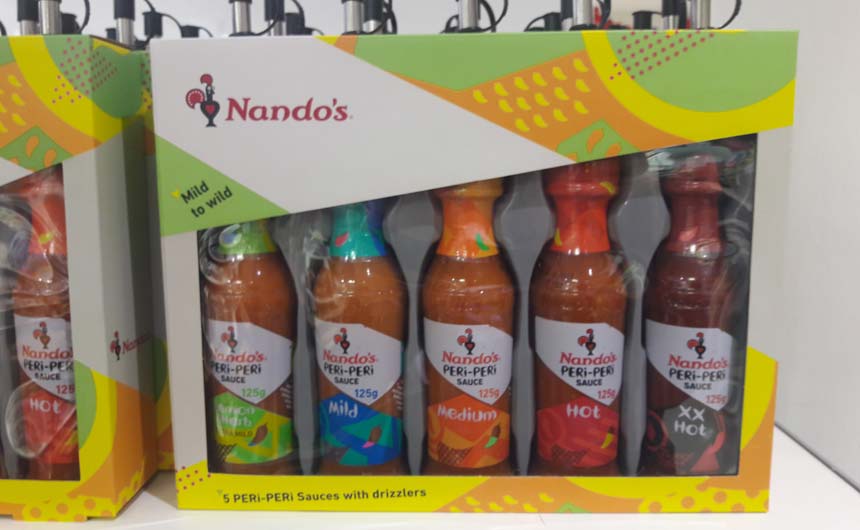
My particular picks were:
Restaurant brands are significant players in the category. This is slightly bucking the trend in terms of the challenges in the casual dining sector. Two stand out ranges were one featuring TGI Fridays and Nando’s. In the case of TGI Fridays, the product ranges were replicating particular dishes and styles from the restaurant, for example Boots was selling TGI Fridays Chip buckets with flavoured salts.
Central to the Nando’s range are its signature sauces. One standout product was in Boots which was a cast iron sizzler pan with hot and medium Peri-Peri rubs. Good attention to detail as the pan featured elements of Nando’s iconic brand design embossed on the pan surface.
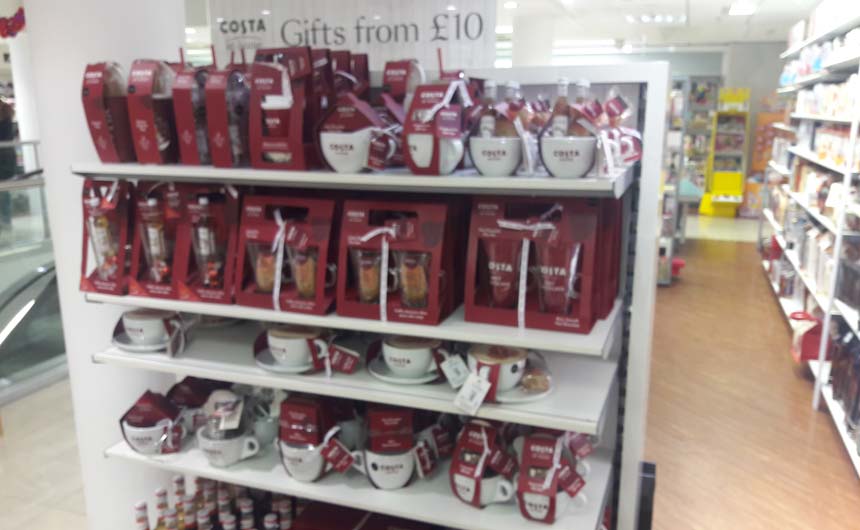
The nation’s love affair with coffee continues. A very prominent brand across retail in the category is Costa Coffee. Debenhams in particular features the brand prominently with a whole combination of gift sets featuring coffee and different types of mugs, coffee accessories and flavours. Debenhams has a heavy commitment to composite gifting and really makes a big play in the category. Products are currently selling at full price, but as we approach Black Friday I suspect retail buyers will be monitoring rate of sale carefully and as Christmas gets nearer discounting will start.
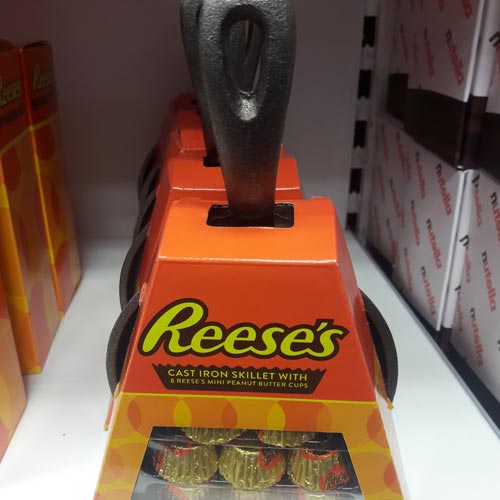
Confectionery and chocolate brands are popular choices with the likes of Reese’s being to the fore. Standard products are combined with keepsake items such as mugs. A brand like Reese’s will use the Christmas gifting category and licensing to extend its distribution, to reach new consumers and as a controlled entry into the gift category. Food gifting could be a launchpad for other year-round products.
Another food brand that has used this category well is Kellogg’s. Using vintage Kellogg’s artwork coupled with mini cereal packs, the brand has been active in this category for a number of years. This is a good example of a well developed and sensibly priced range creating repeat business.
From a licensing point of view, composite gifting should be viewed as an annual business with an opportunity to build a long-term business. New product formats help freshen things up, but some ideas can be repeated particularly when they are well developed ones. Products that combine food products need to well managed and it is important that the licensee can access the food element easily, in appropriate formats and at competitive prices. One point here is that for the food brand food gifting is a great way to get consumers to try your product.
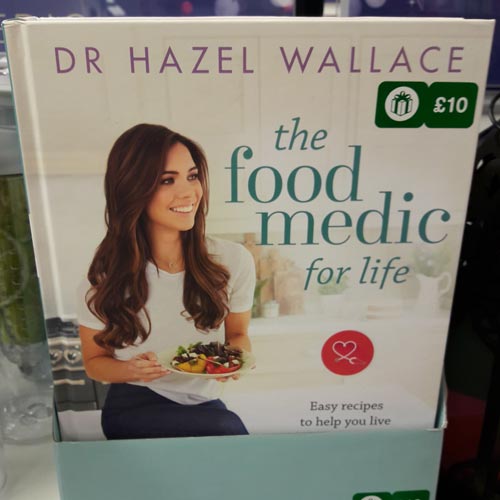
Celebrity ranges also feature. One of the most interesting ones I saw was in Boots. This was a range based around The Food Medic brand – Dr Hazel Wallace. The products on offer included one of her books which in itself was interesting – Boots is not known as a bookseller, but in this case it was a central plank of a range which included items such as The Overnight Oats Kit and The Food Medic Lunch Box.
The Food Medic has come to prominence through social media. A reminder of the growing significance of social media for licensing. Her range reflects her philosophy well and had a prominent display in Boots. Clearly Boots is a great fit for a brand like this. A good example of a retailer selecting a brand that suits them rather than trying to crowbar things in because they appear to be more popular. I think we will see more examples in this category of carefully curated ranges as retailers want to offer some exclusive ranges to consumers and also sell ranges that fit with their specialisms.
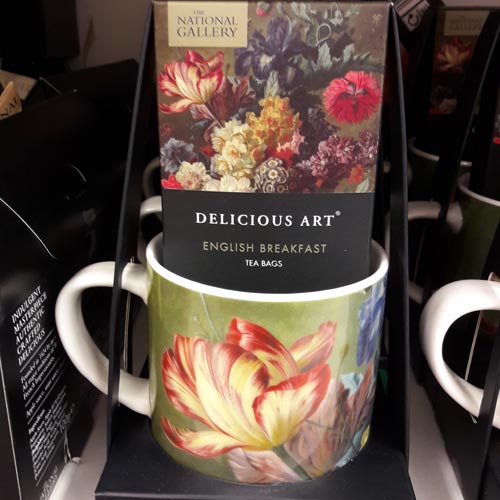
One of the cleverest food gifting ranges I have seen over recent years is that based on artwork from The National Gallery. The range is made up of items such as biscuits, jams and confectionery sold in packaging that features a number of The National Gallery’s most noteworthy pieces of art. The range operates under the brand name Delicious Art. It seems to be performing well. An added bonus for The National Gallery is that it gets to use the brand in its own shops as well. It is a clever use of a heritage licence and nice to see art being used in this fashion. It allows The National Gallery to showcase its collection in a novel way and to reach people who maybe were unaware of the collection before.
It was interesting to see Boots selling an English Heritage range this year as well, focusing on tea and tea drinking. Tea is another popular category in the gifting sector. Composite food and drink gifting is an area that offers heritage brands good potential.
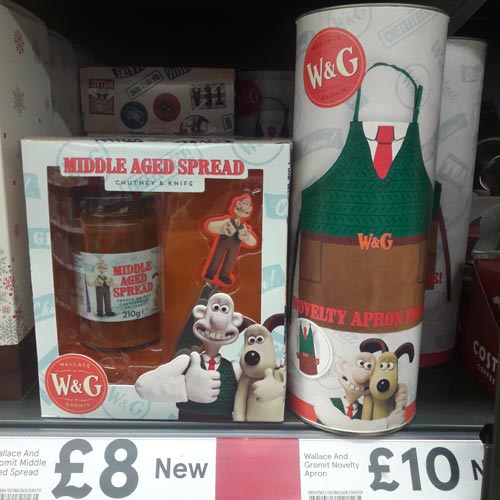
Finally, not all food and gift sets are based directly on food and drink brands, as The National Gallery example shows. There is room for character licensing. I am pleased to say that I spotted two of my own products on my tour.
We have worked with Beams to create a couple of Wallace & Gromit products this year, one being a novelty apron featuring Wallace’s signature jumper and also a Middle Aged Spread set which includes a cheese knife and a special edition chutney.
While it is difficult to compete with the big food brands in this category, it is possible particularly when you bring humour into play. This is also an example of building a range with small steps – hopefully next year the range will grow and incorporate more products.
Ian Downes runs Start Licensing, an independent brand licensing agency. His Twitter handle is @startlicensing – he would welcome your suggestions for what to look out for.





























